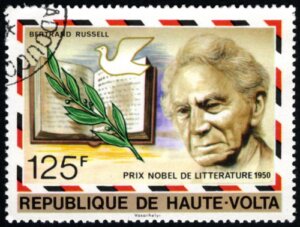Bertrand Russell's Philosophy of Peace and Logic

Bertrand Russell’s views represented one of the most influential approaches in the history of modern philosophy. He was a British scholar and logician, whose work impacted epistemology, metaphysics, the theory of knowledge, and the philosophy of science.
The thoughts of this intellectual were marked by the two world wars. In fact, he reflected on armed conflicts and their effects on humanity. This article explores Russell’s philosophical views, as well as issues related to ethics and coexistence in society that he also addressed.
Bertrand Russell and intellectual transcendence
Bertrand Russell was a British philosopher, mathematician, logician, and pacifist. He was born in 1872 in Trellech, a town in Wales. From childhood, he was involved in political issues, following the family tradition. Moreover, he was imprisoned several times, due to his ideology and his fierce defense of freedom of expression.
Russell’s intellectual life was fruitful. A member of the Vienna Circle, he was one of the pioneers of logical analysis. He argued that language and knowledge are made up of linguistic atoms. These are basic units of meaning combined, according to logical rules, to form complex linguistic expressions.
Russell also made valuable contributions to modern mathematical logic. The UNAM Institute of Mathematics mentions the following achievements:
- Russell’s paradox.
- First-order logic.
- Introduction to the theory of types.
- Defense of logicism or formal logic of mathematics.
The ideas behind Bertrand Russell’s philosophy

Russell’s conception of philosophy was revolutionary. He considered that it fell somewhere between the fields of theology and science. He suggested that theology can’t aspire to exact knowledge, while science appeals to human reason.
“Science is what you know, philosophy is what you don’t know.”
-Bertrand Russell-
Russell tried to develop a clarifying philosophy regarding the metaphysical speculations made to date. His method focused on the logical analysis of language. The philosophical movement to which Russell adhered is logical atomism. This is confirmed in an article that pays tribute to him, published in the National University Magazine.
Logical atomism considers that the world is made up of simple facts. They’re expressed through language and can be studied from their logical form.
Atomic facts have the peculiarity of referring to a single object and its property at a particular moment. An example of this would be the sentence “The apple is red now.”
Based on such facts, more complex meanings or semantic structures are created. They’re able to cover a wider range of reality. However, Russell believed that atomic facts form the basic construction of the world.
The role of language in Bertrand Russell’s philosophy
The analysis of language was central to Russell’s philosophy. It analyzed the meaning of words. They refer to objects and properties of the real world.
The analysis of language begins with sentences understood as propositions. This means that they’re considered linguistic expressions that have the values of either being true or false. At the same time, every sentence or proposition expresses facts about the real world and abstractions from it. For example: “The sky is blue” or “The triangle contains a right angle”.
According to this conception, language fulfills the function of indicating the errors originating from the bad use of grammar. Its analysis represents a solution to philosophical problems.
Russell’s ethics
Bertrand Russell didn’t only write about problems relating to the philosophy of knowledge. In fact, he was also interested in ethics. With these, he established a relationship between happiness and goodness. According to this philosopher, the good and kind individual will be happy.
Thus, Russell developed an ethic of benevolence, due to his moralizing character and compromising and liberal style, claims a work published in Estudi General. His dimension of ethics is contrary to the one founded on the universality of duty and norms. It also proposes pseudo-subjectivism.
Consequently, each individual adopts values as a guide. This is a matter of personal choice. Furthermore, we all write our own definitions of what a good life is. It’s an activity stimulated by our personal feelings and emotions.
At first glance, it might seem that Russell worked on the principle of ethical individualism or morality where each of us is governed by our own rules. But, the reality is that he took into account that kindness or good actions have social repercussions.
“The good life is one inspired by love and guided by knowledge. Neither love without knowledge, nor knowledge without love can produce a good life.”
-Bertrand Russell-
Russell and freedom of expression
Very much in keeping with the spirit of the post-World War era, Russell defended that freedom is the highest aspiration a human being can reach. However, holding this opinion caused problems for the philosopher, who was imprisoned several times.
Russell believed in freedom of thought and expression. Moreover, he alleged that power shouldn’t come through force, even less coercion or restriction of freedom. On the contrary, he praised the freedom to say and do what we think, regardless of what the authorities might say.

A message for the future in Bertrand Russell’s philosophy
Bertrand Russell stood out for his pacifist views. He focused on the defense of social coexistence. With regard to knowledge, he stressed the importance of referring to the facts when studying or considering any philosophy. In other words, he wondered about its real course and questioned the veracity of any related stories. From this position, it’s more difficult for desires to set the criteria.
Continuing with his moral legacy, Bertrand Russell stressed the need for harmony among humans, as well as tolerance, despite the differences that we might have between us. Indeed, he promoted the values of both tolerance and compassion and saw them as imperative for us to live successfully in society.
Bertrand Russell’s views represented one of the most influential approaches in the history of modern philosophy. He was a British scholar and logician, whose work impacted epistemology, metaphysics, the theory of knowledge, and the philosophy of science.
The thoughts of this intellectual were marked by the two world wars. In fact, he reflected on armed conflicts and their effects on humanity. This article explores Russell’s philosophical views, as well as issues related to ethics and coexistence in society that he also addressed.
Bertrand Russell and intellectual transcendence
Bertrand Russell was a British philosopher, mathematician, logician, and pacifist. He was born in 1872 in Trellech, a town in Wales. From childhood, he was involved in political issues, following the family tradition. Moreover, he was imprisoned several times, due to his ideology and his fierce defense of freedom of expression.
Russell’s intellectual life was fruitful. A member of the Vienna Circle, he was one of the pioneers of logical analysis. He argued that language and knowledge are made up of linguistic atoms. These are basic units of meaning combined, according to logical rules, to form complex linguistic expressions.
Russell also made valuable contributions to modern mathematical logic. The UNAM Institute of Mathematics mentions the following achievements:
- Russell’s paradox.
- First-order logic.
- Introduction to the theory of types.
- Defense of logicism or formal logic of mathematics.
The ideas behind Bertrand Russell’s philosophy

Russell’s conception of philosophy was revolutionary. He considered that it fell somewhere between the fields of theology and science. He suggested that theology can’t aspire to exact knowledge, while science appeals to human reason.
“Science is what you know, philosophy is what you don’t know.”
-Bertrand Russell-
Russell tried to develop a clarifying philosophy regarding the metaphysical speculations made to date. His method focused on the logical analysis of language. The philosophical movement to which Russell adhered is logical atomism. This is confirmed in an article that pays tribute to him, published in the National University Magazine.
Logical atomism considers that the world is made up of simple facts. They’re expressed through language and can be studied from their logical form.
Atomic facts have the peculiarity of referring to a single object and its property at a particular moment. An example of this would be the sentence “The apple is red now.”
Based on such facts, more complex meanings or semantic structures are created. They’re able to cover a wider range of reality. However, Russell believed that atomic facts form the basic construction of the world.
The role of language in Bertrand Russell’s philosophy
The analysis of language was central to Russell’s philosophy. It analyzed the meaning of words. They refer to objects and properties of the real world.
The analysis of language begins with sentences understood as propositions. This means that they’re considered linguistic expressions that have the values of either being true or false. At the same time, every sentence or proposition expresses facts about the real world and abstractions from it. For example: “The sky is blue” or “The triangle contains a right angle”.
According to this conception, language fulfills the function of indicating the errors originating from the bad use of grammar. Its analysis represents a solution to philosophical problems.
Russell’s ethics
Bertrand Russell didn’t only write about problems relating to the philosophy of knowledge. In fact, he was also interested in ethics. With these, he established a relationship between happiness and goodness. According to this philosopher, the good and kind individual will be happy.
Thus, Russell developed an ethic of benevolence, due to his moralizing character and compromising and liberal style, claims a work published in Estudi General. His dimension of ethics is contrary to the one founded on the universality of duty and norms. It also proposes pseudo-subjectivism.
Consequently, each individual adopts values as a guide. This is a matter of personal choice. Furthermore, we all write our own definitions of what a good life is. It’s an activity stimulated by our personal feelings and emotions.
At first glance, it might seem that Russell worked on the principle of ethical individualism or morality where each of us is governed by our own rules. But, the reality is that he took into account that kindness or good actions have social repercussions.
“The good life is one inspired by love and guided by knowledge. Neither love without knowledge, nor knowledge without love can produce a good life.”
-Bertrand Russell-
Russell and freedom of expression
Very much in keeping with the spirit of the post-World War era, Russell defended that freedom is the highest aspiration a human being can reach. However, holding this opinion caused problems for the philosopher, who was imprisoned several times.
Russell believed in freedom of thought and expression. Moreover, he alleged that power shouldn’t come through force, even less coercion or restriction of freedom. On the contrary, he praised the freedom to say and do what we think, regardless of what the authorities might say.

A message for the future in Bertrand Russell’s philosophy
Bertrand Russell stood out for his pacifist views. He focused on the defense of social coexistence. With regard to knowledge, he stressed the importance of referring to the facts when studying or considering any philosophy. In other words, he wondered about its real course and questioned the veracity of any related stories. From this position, it’s more difficult for desires to set the criteria.
Continuing with his moral legacy, Bertrand Russell stressed the need for harmony among humans, as well as tolerance, despite the differences that we might have between us. Indeed, he promoted the values of both tolerance and compassion and saw them as imperative for us to live successfully in society.
All cited sources were thoroughly reviewed by our team to ensure their quality, reliability, currency, and validity. The bibliography of this article was considered reliable and of academic or scientific accuracy.
- Irvine, A.D. (s.f.). Russell, Bertrand. Instituto de Matemáticas UNAM. Consultado el 26 de abril de 2023. https://paginas.matem.unam.mx/cprieto/biografias-de-matematicos-p-t/230-russel-bertrand#:~:text=Sus%20contribuciones%20relativas%20a%20las,el%20c%C3%A1lculo%20predicado%20de%20primer
- Sierra Mejía, R. (1972). Homenaje a Bertrand Russell. Revista de la Universidad Nacional (1944 – 1992), (11), 184–192. https://revistas.unal.edu.co/index.php/revistaun/article/view/12343
- Paciano Fermoso, E. «Bertrand Russell: Teórico de la Educación». Estudi General, 1981 (1), 159-168. https://raco.cat/index.php/EstudiGral/article/view/43552
This text is provided for informational purposes only and does not replace consultation with a professional. If in doubt, consult your specialist.







